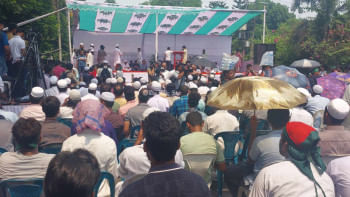PBI Report on Militancy: Suspects slipped out

It was on July 29, 2011.
A Rab team arrested Iftekhar Ahmed Chowdhury, a member of banned militant outfit Hizb-ut Tahrir, from Madina Market Jame Mosque area in Sylhet city when he was distributing the organisation's leaflets.
Subsequently, an officer of the elite crime busters filed a case against the suspected militant, then 19, on the charge of anti-state activity under the Anti-Terrorism Act.
Hailing from Golapganj upazila of Sylhet, Iftekhar alias Abid later obtained bail from a Sylhet court. Police submitted the charge sheet against him and a court framed charges in his absence on June 5, 2012.
The case is still under trial at the Anti-Terrorism Special Tribunal in Sylhet.
Iftekhar did not appear before the court ever since he got bail. Rather, he snuck out of the country, dodging law enforcers and immigration.
Later, the Police Bureau of Investigation (PBI), dedicated to investigating critical and high-profile cases, tracked him down after multipronged investigations and found he was living in Canada.
Iftekhar's case, however, is not an isolated one.
As many as 18 militants of different outfits, all accused in cases filed for terrorist activities between 2000 and 2016, fled the country either after obtaining bail from the court or without ever being arrested.
They were now living in 13 countries spanning North America, Europe, Middle East and Asia, said PBI, a specialised police unit, in a report.
The report, however, did not mention how the accused managed passports and crossed immigration. Neither did it say the time the accused fled the country.
The PBI found that 23 militants, who are accused in different terrorism related cases, have gone into hiding after obtaining bail with their family members and relatives having no idea about their whereabouts.
The police unit prepared the report after over two years of investigation and visits to present and permanent addresses of around 3,700 militants named in the PBI database.
They are the accused in different terrorism-related cases filed since 2000.
The PBI also inquired at the courts for information.
Recently, the report, along with a list of militants on the run, was sent to Police Headquarters and various other police units, including the Special Branch (SB) and Anti-Terrorism Unit (ATU).
The Daily Star obtained a copy of the list and the summary of the report.
"Forty-one militants who were freed on bail do not appear before courts," reads the report.
"After talking to the family and local sources it's learnt that 18 of them are now living abroad while 23 others do not maintain any sorts of communications with their family members. People of their localities do not even know their whereabouts," it said.
Those who were their bail guarantors could not give any information about their location, the report added.
PBI Chief Deputy Inspector General Banaj Kumar Majumder admitted preparing such a report.
"We carry out research on different topics and the research on the militants is one such work," he said last week, when asked why PBI made this report while it is dedicated to investigating crucial cases.
He, however, refused to give further details, saying it was a confidential document.
Acknowledging the PBI list, Monirul Islam, chief of Counter Terrorism and Transnational Crime (CTTC) unit of DMP, said the CTTC along with police stations concerned is also trying to nab those hiding abroad and those not appearing before courts.
"We are looking for initiatives to bring back those who are living abroad," he told The Daily Star.
But how these accused managed to flee the country remains a big question while counterterrorism officials always consider them a threat.
Special Branch officials said if anyone is applying for a passport they need a police verification report where police would mention if he or she is accused in any criminal cases.
Requesting anonymity, they said it is up to the Department of Immigration and Passport (DIP) whether it would issue or deny passports to anyone accused in criminal cases.
ATM Abu Asad, additional director general of the DIP, said they do not issue passports to anyone if they learn from a police verification report that the individual is accused in a criminal case.
He, however, said one can commit a crime after getting a passport, which they are not supposed to know.
WHO'S LIVING WHERE
With the PBI list, The Daily Star correspondents went to the houses of some of the suspected militants who have been on the run.
Abdul Matin Biswas is one of them.
Arrested 12 years ago in Gaibandha for his connection with a banned militant outfit, he came out of jail on bail around a year later and has been on the run since.
Matin is also accused in two other terrorism cases filed with Shibganj Police Station in Chapainawabganj and Jhenidah Sadar Police Station.
The suspect is now in South Africa, according to the PBI report.
The district correspondent of this paper visited his home village in Laxmipur of Kotchandpur upazila in Jhenidah on February 6 and learned that none of Matin's family members live there anymore.
Matin studied up to class-VIII in his village and then moved to Arappur area in the district town.
Abdul Kuddus, one of his neighbours, said they heard that around eight to nine years back Matin left the country. Now his wife is living at his home in the district town with a son and two daughters.
Saleh Al Arif, from Bishwanath upazila in Sylhet, is another suspected militant who was arrested while preparing to bring out a procession in the city on February 21, 2014.
An active member of Hizb-ut Tahrir, he was found with the organisation's leaflets and banner, according to case documents.
He obtained bail and fled the country.
Police later submitted a charge sheet, and his trial began in 2016 in his absentia in a Sylhet court and the case is still under trial.
As per the PBI report, Saleh has moved to Portugal from Sweden.
But, according to international media reports, he was living with his family at Rochdale in Manchester in the UK.
His father Jalal Uddin came under attack in Rochdale in February 2016. Islamic State supporters killed the man, who was a respected Imam in the Bengali community, the reports said.
Saleh talked to the media after Islamic State supporter Mohammed Syeedy was handed a life sentence for helping murder his father.
The case of Shafiq, another accused militant as per the PBI report, is different.
He is now living in the US.
Son of Kayum Mondol of Dewalabari village of Melandaha in Jamalpur, Shafiq passed Secondary School Certificate (SSC) in 1992. He was the Melandaha Government College unit president of Bangladesh Chhatra League in 1995, three locals said.
He passed Bachelor of Arts from the same college and later became the vice-president of Jamalpur district BCL, they said.
Though the PBI mentioned that he was accused in three cases, local sources said he was actually accused in four cases -- one filed under the Explosive Substances Act in August 2005 and three others in May 2005.
Police pressed a charge sheet against him in two cases. He was acquitted by a court in one of the cases in 2008 while the complainant withdrew the other.
Shafiq got a DV lottery and managed a passport from Mymensingh regional passport office in 2006 and left for the US where he has been living since.
The locals said the cases were filed on political ground as the BNP-led alliance government was in power at that time.
His family is involved in Awami League politics, they added.
Shafiq's father is a member of Melandaha upazila AL advisory committee while his other brothers are also holding posts of the union AL.
One of his six brothers Mahfuzul Haque Mafle is the incumbent chairman of No 4 Nangla Union Parishad and president of the union AL.
Talking to The Daily Star, Mafle said, "We have given necessary information to all the agency members whoever came to us."
He refused to discuss the issue any further, saying he was busy.
THE REMAINING OTHERS
The PBI list mentioned the countries where the remaining other suspects are living now.
Saifullah of Narayanganj is now living in Malaysia; Abul Kalam of Narsingdi in Dubai; Md Ismail Hossain of Chandpur in Maldives; Junnon Shikder of Cumilla in Syria; Khandaker Mohammad Kamaluddin alias Saker in Saudi Arabia; Didar of Habiganj in Agartala, India; Golam Hossain Pramanik of Rajshahi in Singapore; Russle Hawlader in Malaysia; Md Zakir Hossain of Rajshahi in Dubai; Rashedul Hasan of Meherpur in Saudi Arabia; Hafez Mahmud Hasan of Faridpur in Europe; Md Khwaja Mollah of Khulna in India, and Mahfuza Begum of Narail in India.
Kamaluddin alias Saker, an accused in a 76kg bomb plot in 2000 against now Prime Minister Sheikh Hasina, then opposition leader, got acquittal when the verdict of the case was delivered.
[Dwoha Chowdhury also contributed to this report]

 For all latest news, follow The Daily Star's Google News channel.
For all latest news, follow The Daily Star's Google News channel. 



Comments